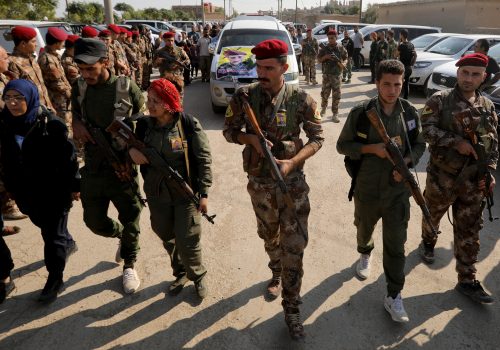Fragmentation and perceived bias: The shortcomings of US policy towards tribes in Syria
In 2015, while the United States and its allies were preparing to mobilize local forces in northeastern Syria to lead the fight against the Islamic State of Iraq and al-Sham (ISIS), some Syrian tribal leaders were summoned to Geneva, Switzerland to hold talks with Western powers and Gulf states over the possibility of mobilizing against these militants. The expectation was that the US would create a Syrian equivalent to the “Sunni Awakening,” a movement in which Sunni tribesmen in Iraq realigned themselves to help the US counter al-Qaeda between 2005 and 2008. Instead, the US ended up supporting the formation of the Syrian Democratic Forces (SDF), which is made up of the Kurdish People’s Protection Units (YPG) and other small Arab factions, such as the al-Sanadid Forces of the Arab Shammar tribe.
So why did the US fail to employ the Arab tribes as local proxies in its fight against ISIS in northeastern Syria? And what are the shortcomings of the current US policy towards the Arab population in northeastern Syria, where there is a US military presence to support the SDF counter an ISIS resurgence? The fragmentation and divisions that plague the Arab tribal population in northeastern Syria played a major role in the US’s decision not to rely primarily on tribal auxiliaries in its fight against ISIS. In addition, the current US policy has some shortcomings, which make the US appear more biased in favor of the Kurds than the Arabs. These shortcomings are also driving tribes into the hands of other players, such as the Syrian regime and Iran, who use their links to the tribes to destabilize SDF-controlled area.
Division and fragmentation rendered tribes unreliable allies to the US
When the protest movement began in Syria in 2011, tribalism played a major role in mobilizing the youth against the regime, particularly in the restive areas of the country. As the uprising turned into an armed conflict, two features characterized the tribal community in northeastern Syria.
First, many tribal youths that grew up with identities in addition to their tribal affiliation—such as religious or national associations—endured profound changes as a result of urbanization and education that decreased traditional solidarities. This caused many of the tribal leaders in northeastern Syria to have difficulty asserting authority over their youth. Second, inter-tribal conflicts started to emerge on a large scale, as competition among different clans arose to gain as much of the ongoing war’s spoils as possible. Among those were oil and gas fields taken over by different clans in the countryside of Deir Ezzor and Hassakeh governorates. This is not to say that the tribes were incapable of mobilizing against ISIS. There were several effective tribal militias such as the Shammar tribe’s al-Sanadid Forces and Army of the Tribes, which is composed mainly of members of al-Walda clan, but these were small groups that could not effectively fight on a large scale across northeastern Syria.
The aforementioned situation prompted US officials dealing with ISIS in 2014 to conclude that Arab tribes were fragmented and therefore could not be a united front against ISIS. The YPG appeared to be a much more organized, reliable force that could supervise and train Syrian tribal militias in their limited geographical locality. The Kurds showed unitary command and control, something that the Arab tribes lacked.
Current US tribal policy towards the Syrian tribes and its shortcomings
As soon as the SDF defeated ISIS and gained control of the land inhabited by the Arab tribes to the east of the Euphrates River in 2018, the US started to approach the Arab tribes differently. US envoys held meetings with tribal leaders in Raqqa, Deir Ezzor, and Hassakeh governorates. For example, in 2017, Brett McGurk, former Presidential Envoy to the Middle East, met with sheikhs from all major tribes in Raqqa province. Additionally, the US organized visits by its allies—Saudi Arabia and the United Arab Emirates—to the region on numerous occasions to meet with Syrian tribal leaders. The US also recognized the anniversary of the Sheitat massacre, in which ISIS killed more than seven hundred members of the Sheitat tribe in the Deir Ezzor countryside in 2014. In its statement recognizing the massacre, the US embassy in Damascus’ Facebook page praised the role of the Sheitat tribe in resisting ISIS in 2014. These instances demonstrate that US policy towards Syrian Arab tribes aims to create a united tribal position under SDF command in northeastern Syria. However, this current strategy has shortcomings that endanger US national interests in Syria for a series of reasons.
Since the defeat of ISIS in Syria in 2018, US officials have held regular covert meetings with tribal sheikhs without realizing the grave long-term consequences for these leaders themselves. Meeting with tribal leaders without providing them protection or intelligence exposes them to assassination attempts by ISIS sleeper cells. Seeing them as an existential threat to remnants of ISIS, the terrorist group described the sheikhs, tribal leaders, and mukhtars as apostates. ISIS then assassinated a number of tribal leaders, including Sheikh Bashir Faisal al-Huwaidi in Raqqa in 2018, Sheikh Ubaid Khalaf al-Hassan in Raqqa in 2019, and Sheikh Mutsher Hamud Jeidan al-Hifl in Deir Ezzor in 2020. These assassinations fomented anger and frustration among the Arab population of Deir Ezzor and eroded the confidence of other tribal leaders in the ability of the US and the SDF to provide safety and protection.
In addition, the US’s uncertain presence in northeastern Syria gives tribes the assumption that the US is an unreliable force in the region. President Donald Trump’s numerous announcements that the US planned to withdraw its forces from Syria has created a feeling of anxiety and mistrust of the US and its long-term plans in Syria among members of the Arab tribes. One of the local tribesmen in the region told us that, “The US announcing that it will withdraw its forces from Syria has shaken our confidence in the protection of the US. It made us reluctant to cooperate with the US and SDF because we became concerned about our lives as a result of any punitive measures that could be imposed by the regime or Iran if they take over our territories following the US withdrawal.”
This precariousness encourages local and regional actors to compete for the tribes’ loyalty in SDF-controlled areas in order to foment hostility towards the US. For instance, in February 2020, members of the al-Ghanamah clan attempted to block a patrol of US troops outside the northern Syrian city of Qamishli. The Syrian regime which has patronage connections with some tribal leaders in the region has apparently encouraged the incident. Iran tries its own tactics to woo Syria’s Arab tribes, as well. Iranian officials continue to invite Syrian tribal leaders to Tehran for talks to persuade them to remain loyal to Bashar al-Assad. During these visits—covered by Iranian and Syrian state media—Syrian tribal leaders denounce the US presence in their country, referring to it as an “occupation”.
Finally, the Arab population of northeastern Syria see the US as not exerting enough pressure on the SDF to diversify and create inclusive local governance. They consider the SDF to maintain significant control on the decision-making process in local governance in their regions. One of the locals in Raqqa explained to us that even though there is Arab representation in various SDF-established local councils, the final word on any important governance matter is made by Kurdish advisory figures that dominate leadership and management positions within SDF bodies. In enabling more Arab representation in SDF governance bodies, the US could play a more impartial role between the Arabs and the Kurds, which would help diminish suspicion and mistrust that many tribes have of the SDF.
Having said that, the area to the east of the Euphrates plays a multi-faceted role in preventing the resurgence of ISIS and thwarting any plans by Iran to expand its influence into this part of Syria. Although the US did not rely primarily on Arab tribes in its campaign against ISIS, US officials have been dealing with Arab tribal representatives to prevent ISIS resurgence and legitimize SDF rule in their areas. However, this policy has had many shortcomings. If the US wants to establish a long-term and sustainable existence in northeastern Syria, it needs to remedy these shortcomings under the incoming Joe Biden administration.
Haian Dukhan is a Carnegie postdoctoral fellow at the Central European University’s Centre for Religious Studies. Follow him on Twitter: @DukhanHaian.
Ammar Alhamad is an MA student in international relations at Hasan Kalyoncu University in Gaziantep, Turkey. He is from Raqqa and has worked for different international organisations on issues related to the Syrian Conflict since 2013.
Image: Brett McGurk, U.S. envoy to the coalition against Islamic State, walks in the town of Tabqa, Syria June 29, 2017. REUTERS/Rodi Said


